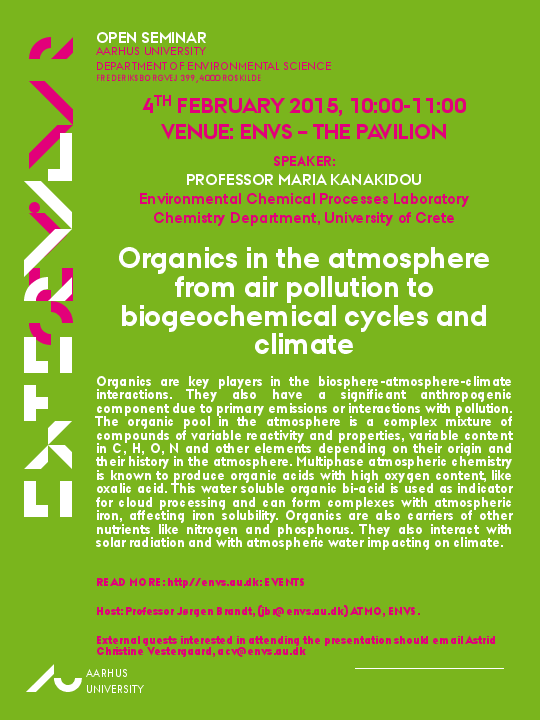Official ENVS seminar with Professor Maria Kanakidou, University of Crete
Title: Organics in the atmosphere from air pollution to biogeochemical cycles and climate.
Oplysninger om arrangementet
Tidspunkt
Sted
The Pavilion, Roskilde
Arrangør

”Are you interested in knowing more about the role of organics in the atmosphere?”
- then feel free to join the Open Seminar on Wednesday the 4th of February 2015, 10:00-11:00 in P1.16 (The Pavilion, AU Roskilde).
Speaker: Professor Maria Kanakidou, Environmental Chemical Processes Laboratory, Chemistry Department, University of Crete
Title: Organics in the atmosphere from air pollution to biogeochemical cycles and climate
Abstract:
Organics are key players in the biosphere-atmosphere-climate interactions. They also have a significant anthropogenic component due to primary emissions or interactions with pollution.
The organic pool in the atmosphere is a complex mixture of compounds of variable reactivity and properties, variable content in C, H, O, N and other elements depending on their origin and their history in the atmosphere.
Multiphase atmospheric chemistry is known to produce organic acids with high oxygen content, like oxalic acid. This water soluble organic bi-acid is used as indicator for cloud processing and can form complexes with atmospheric iron, affecting iron solubility. Organics are also carriers of other nutrients like nitrogen and phosphorus. They also interact with solar radiation and with atmospheric water impacting on climate.
In line with this vision for the role of organics in the atmosphere, we present results from a global 3-dimensional chemistry-transport model on the role of gaseous and particulate organics in atmospheric chemistry, accounting for multiphase chemistry and aerosol ageing in the atmosphere as well as nutrients emissions, atmospheric transport and deposition.
Historical simulations and projections highlight the human impact on air quality and atmospheric deposition to the oceans. The results are put in the context of climate change. Uncertainties and implications of our findings for biogeochemical and climate modeling are discussed.
Host: Professor Jørgen Brandt, (jbr@envs.au.dk)
External guests interested in attending the presentation should email:
Astrid Christine Vestergaard, acv@envs.au.dk
